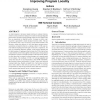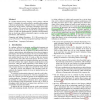177 search results - page 1 / 36 » The garbage collection advantage: improving program locality |
OOPSLA
2004
Springer
14 years 24 days ago
2004
Springer
As improvements in processor speed continue to outpace improvements in cache and memory speed, poor locality increasingly degrades performance. Because copying garbage collectors ...
IWMM
2011
Springer
12 years 10 months ago
2011
Springer
In a parallel, shared-memory, language with a garbage collected heap, it is desirable for each processor to perform minor garbage collections independently. Although obvious, it i...
APLAS
2006
ACM
13 years 11 months ago
2006
ACM
We present a method to visit all nodes in a forest of data structures while taking into account object placement. We call the technique a Localized Tracing Scheme as it improves lo...
IWMM
2007
Springer
14 years 1 months ago
2007
Springer
Past studies have shown that objects are created and then die in phases. Thus, one way to sustain good garbage collection efficiency is to have a large enough heap to allow many ...
OOPSLA
2005
Springer
14 years 28 days ago
2005
Springer
Currently, the most adopted criterion to invoke garbage collection is heap space exhaustion. In other words, garbage collection is invoked when the heap space (either the entire s...


